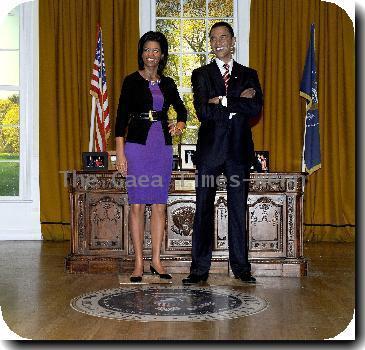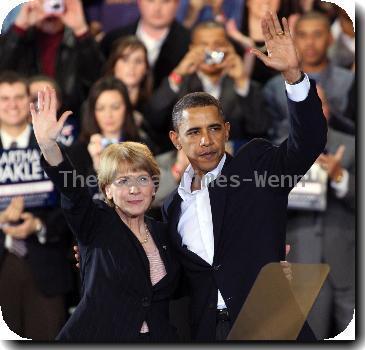Clinton in Middle East to discuss Iran nuclear threat with US allies
By Robert Burns, APSunday, February 14, 2010
Clinton visits key allies in Persian Gulf
DOHA, Qatar — U.S. Secretary of State Hillary Rodham Clinton launched a quick visit to two Persian Gulf allies Sunday as part of a broader Obama administration effort to shore up support for taking a tougher stance against Iran’s nuclear program.
Her stops in Qatar and in Saudi Arabia coincide with a string of diplomatic and military contacts in the Middle East, including a visit to Egypt Sunday by Adm. Mike Mullen, chairman of the Joint Chiefs of Staff. Clinton’s top three deputies — James Steinberg, Jacob Lew and William Burns — will be in the region in coming days, and a Clinton aide said Gen. David Petraeus, chief of U.S. Central Command with responsibility for U.S. military operations across the Middle East, would also be in the region.
Their agenda is not focused exclusively Iran. There also is an American push for closer cooperation in Yemen against al-Qaida, a move toward bolstering diplomatic relations with Syria and efforts to get Israeli-Palestinian peace negotiations back on track.
After an overnight flight from Washington, Clinton went directly into a series of high-level meetings in the Qatari capital and was delivering an evening speech at the US-Islamic World Forum, where she was expected to echo and elaborate on President Barack Obama’s call during an appearance at Cairo University in Egypt last June for a new level of engagement with the Muslim world.
She also was holding a one-on-one meeting with Turkish Prime Minister Recep Tayyip Erdogan, who was attending the U.S.-Islamic World Forum, which is jointly organized by the Qatari foreign ministry and the U.S. Brookings Institution’s Saban Center for Middle East Policy.
Obama addressed the forum by video on Saturday, announcing that he is appointing a special envoy to the Organization of the Islamic Conference.
In Cairo, Mullen met with Egyptian President Hosni Mubarak and said afterward that Iran is a key challenge to the security of the Middle East. He accused Tehran of spreading its radical influence in Lebanon, Gaza, Yemen and Iraq. And he said the United States will work through the U.N. Security Council to seek new sanctions on Iran. He said Washington has no specific plans for military action against Iran.
On Monday Clinton is scheduled to travel to Saudi Arabia — first to the capital, Riyadh, and then on Tuesday to the Red Sea city of Jeddah.
It is Clinton’s first visit to Qatar and Saudi Arabia as secretary of state. She delayed her departure from Washington by one day after her husband, former President Bill Clinton, was hospitalized in New York on Thursday for a heart procedure.
Saudi Arabia and Qatar, both situated across the Persian Gulf from Iran, are concerned about Iran’s nuclear ambitions. They are seen by the Obama administration as an important part of a regional effort to persuade the Iranians that it is in their economic interest to give up their uranium enrichment program as called for in a series of Security Council resolutions that Iran has ignored.
The State Department’s top Middle East policy officer, Jeffrey Feltman, who was accompanying Clinton, told reporters on the flight from Washington that Iran would figure prominently in Clinton’s discussions in both Qatar and in Saudi Arabia.
Feltman said the U.S. believes the two Gulf allies, as well as other countries in the region, can help “sharpen the question for Iran” as to whether it is better off continuing to seek higher-enriched uranium that is closer to weapons grade or halt the program.
“We would expect them (Gulf allies) to use their relationship in ways that can help increase the pressure that Iran feels,” Feltman said.
On the Net:
U.S.-Islamic World Forum: tinyurl.com/yld8afy
Tags: Africa, Barack Obama, Bill Clinton, Cairo, Doha, Egypt, Geography, Iran, Middle East, North Africa, North America, Qatar, Saudi Arabia, United States, Yemen







